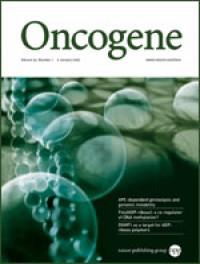Oncogene Q1 Unclaimed
Oncogene aims to make substantial advances in our knowledge of processes that contribute to cancer by publishing outstanding research. We propagate work that challenges standard conjecture and builds on previous studies, in particular those that lead to establishing new paradigms in the etio-pathogenesis, diagnosis, treatment, or prevention of cancers, and in processes that drive metastatic spread, and provide important insights into cancer biology beyond what has been revealed thus far. It has an SJR impact factor of 2,489.
Oncogene focuses its scope in these topics and keywords: cancer, cell, expression, human, tumor, gene, growth, regulates, cells, protein, ...
Type: Journal
Type of Copyright:
Languages: English
Open Access Policy: Open Choice
Type of publications:
Publication frecuency: -


4190 €
Inmediate OANPD
Embargoed OA0 €
Non OAMetrics
2,489
SJR Impact factor380
H Index305
Total Docs (Last Year)1260
Total Docs (3 years)16502
Total Refs8748
Total Cites (3 years)1253
Citable Docs (3 years)6.49
Cites/Doc (2 years)54.1
Ref/DocOther journals with similar parameters
Molecular Cell Q1
Cell Research Q1
Annual Review of Plant Biology Q1
Cell Host and Microbe Q1
Annual Review of Medicine Q1
Compare this journals
Aims and Scope
Best articles by citations
Repression of mRNA for the PLK cell cycle gene after DNA damage requires BRCA1
View moreAltered levels and regulation of stathmin in paclitaxel-resistant ovarian cancer cells
View moreREC8 functions as a tumor suppressor and is epigenetically downregulated in gastric cancer, especially in EBV-positive subtype
View moreDifferentially expressed genes are marked by histone 3 lysine 9 trimethylation in human cancer cells
View moreIdentification of maspin and S100P as novel hypomethylation targets in pancreatic cancer using global gene expression profiling
View moreExpression and functional significance of CDC25B in human pancreatic ductal adenocarcinoma
View moreJMJD6 regulates histone H2A.X phosphorylation and promotes autophagy in triple-negative breast cancer cells via a novel tyrosine kinase activity
View moreCD95/Fas signaling in human melanoma cells: conditional expression of CD95L/FasL overcomes the intrinsic apoptosis resistance of malignant melanoma and inhibits growth and progression of human melanoma xenotransplants
View moreIntroductory comments
View moreRetinal dysplasia in mice lacking p56lck
View moreApoptosis signaling triggered by the marine alkaloid ascididemin is routed via caspase-2 and JNK to mitochondria
View morePathogenic mutations in neurofibromin identifies a leucine-rich domain regulating glioma cell invasiveness
View moreThe MAP-kinase ERK2 is a specific substrate of the protein tyrosine phosphatase HePTP
View moreMutations of BRAF and KRAS2 in the development of Barrett's adenocarcinoma
View moreGene expression profiling of ErbB receptor and ligand-dependent transcription
View moreAngiomotin expression promotes hemangioendothelioma invasion
View moreErratum: Distinct pattern of TP53 mutations in squamous cell carcinoma of the esophagus in Iran
View moreAlpha-catenin is required for IGF-I-induced cellular migration but not invasion in human colonic cancer cells
View moreCritical role of cyclin D3 in TSH-dependent growth of thyrocytes and in hyperproliferative diseases of the thyroid gland
View moreOligomerization of p53 is necessary to inhibit its transcriptional transactivation property at high protein concentration
View moreInhibition of tumor-associated fatty acid synthase activity antagonizes estradiol- and tamoxifen-induced agonist transactivation of estrogen receptor (ER) in human endometrial adenocarcinoma cells
View morePolo-like kinases, an introduction
View moreGuest Editor
View moreA novel protein, RTN-xS, interacts with both Bcl-xL and Bcl-2 on endoplasmic reticulum and reduces their anti-apoptotic activity
View more
Comments